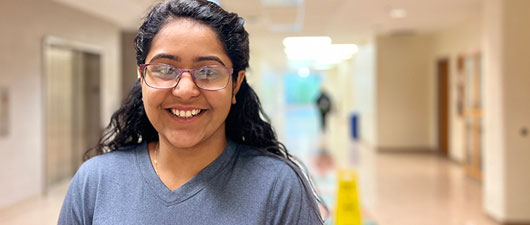 Pictured | Dhruval Chaudhari | Bachelor of Science in Biological Sciences / Minors in Chemistry and Math | Bapupura, Gujarat, India (hometown)
Pictured | Dhruval Chaudhari | Bachelor of Science in Biological Sciences / Minors in Chemistry and Math | Bapupura, Gujarat, India (hometown)
Honors Program
Club Affiliations | Biology and Chemistry Club; Botany Club
Bachelor of Science in Biological Sciences
The Bachelor of Science (BS) degree in Biological Sciences prepares students for a career as a professional biologist and is geared toward students who wish to enter post-graduate studies in any area of biology or one of the health professions (e.g., dentist, physician, optometrist, pharmacist, physician assistant, physical therapist, or veterinarian). Graduates are also well prepared for careers in private industry, with non-profit or government organizations, or teaching at the secondary level. To help foster student success, biology faculty provide high-quality academic and career advising throughout the student’s time at IU South Bend. Students receive a strong, up-to-date grounding in biology, and with a wide variety of elective courses, students are able to tailor their major toward their career goals.
The curriculum also educates students in the process of scientific discovery, with emphasis on reading scientific literature, writing about and presenting scientific information, designing scientific studies, and collecting, manipulating, and analyzing scientific data. Many students work closely with faculty on independent research projects that provide valuable laboratory and field skills and increase success in applications for post-graduate positions or jobs in the private sector. Students receive strong introductions to the cognate areas of chemistry, physics, and mathematics, and all Biological Sciences BS graduates may earn a minor in chemistry without taking additional courses, if they earn appropriate grades in the required Chemistry courses.
Academic Advising
Students planning to major in biological sciences should contact an academic advisor in biological sciences before their first semester to develop a plan for their academic course of study. College policy on advising requires that students meet with their academic advisors at least once each year; biology majors meet with their advisors prior to each semester’s enrollment. Advising holds are reset following advising appointments. To determine the name and contact information for your advisor, see One.IU.
Degree Requirements (120 cr.)
Degree Map >>
Students receiving the Bachelor of Science degree in Biological Science must complete 120 total credit hours including
- Math courses for the BS in Biological Science fulfill the Fundamental Literacies: Quantitative Reasoning requirement.
- BIOL-L 403 Biology Seminar fulfills the Extended Literacies: Visual Literacy requirement and is required for all Biological Science majors
- Major Requirements (61-62 cr.)
- Elective Requirements (22 cr.) | Placement out of, by placement examination, or successful completion of at least one course at the 200–level or higher; or formal training, as evidenced by secondary or university diplomas, in a language other than English.
- Free Electives (balance of credits needed to equal 120 cr. requirement)
- Biology courses must be completed with a grade of C- or higher.
- A minimum of 30 credit hours at the 300– or 400–level.
- All courses are 3 credit hours, unless otherwise noted.
Major Requirements (61-62 cr.)
Biological Sciences
- BIOL-L 101 Introduction to Biological Sciences 1 (5 cr.)
- BIOL-L 102 Introduction to Biological Sciences 2 (5 cr.)
- BIOL-L 211 Molecular Biology
- BIOL-L 311 Genetics
- BIOL-L 403 Biology Seminar
Chemistry
- CHEM-C 105 Principles of Chemistry I
- CHEM-C 106 Principles of Chemistry II
- CHEM-C 125 Experimental Chemistry I (2 cr.)
- CHEM-C 126 Experimental Chemistry II (2 cr.)
- CHEM-C 341 Organic Chemistry Lecture 1
- CHEM-C 342 Organic Chemistry Lecture 2
- CHEM-C 343 Organic Chemistry Laboratory 1 (2 cr.)
- CHEM-C 344 Organic Chemistry Laboratory 2 (2 cr.)
Physics
Select one of the following sequences:
Sequence 1
- PHYS-P 201 General Physics 1 (5 cr.)
- PHYS-P 202 General Physics 2 (5 cr.)
Sequence 2
- PHYS-P 221 Physics 1 (5 cr.)
- PHYS-P 222 Physics 2 (5 cr.)
Mathematics
- MATH-M 215 Calculus I (5 cr.)
- MATH-M 216 Calculus II (5 cr.)
Statistics
Select one from the following:
- BIOL-L-337 Introduction to Biostatistics
- MATH-K 310 Statistical Techniques
- MATH-M 261 Statistical Inferences (2 cr.)
- PSY-P 354 Statistical Analysis in Psychology
Elective Requirements in Biology (22 cr.)
Students must complete at least 22 additional credit hours of elective Biological Sciences courses. This coursework must include at least three laboratory classes, at least one course from the Organismal courses area, and at least one course from the Cellular courses area.
Organismal Courses
- BIOL-B 300 Vascular Plants
- BIOL-L 304 Marine Biology
- BIOL-L 308 Organismal Physiology (5 cr.)
- BIOL-L 318 Evolution
- BIOL-L 342 Tropical Marine Biology Field Course
- BIOL-L 391 Special Topics in Biology (1-3 cr.)
- BIOL-L 473 Ecology
- BIOL-L 474 Field and Laboratory Ecology (2 cr.)
- BIOL-Z 373 Entomology
- BIOL-Z 383 Laboratory in Entomology (2 cr.)
- BIOL-Z 460 Animal Behavior
- PHSL-P 262 Human Anatomy and Physiology 2 (4 cr.)
Cellular Courses
- BIOL-L 280 Introduction to Bioinformatics
- BIOL-L 312 Cell Biology
- BIOL-L 313 Cell Biology Laboratory
- BIOL-L 317 Developmental Biology
- BIOL-L 321 Principles of Immunology
- BIOL-L 323 Molecular Biology Laboratory
- BIOL-L 334 Biology of Cancer
- BIOL-L 338 Introduction to Genomics
- BIOL-L 391 Special Topics in Biology (1-3 cr.)
- BIOL-M 430 Virology Lecture
- MICR-M 310 Microbiology
- MICR-M 315 Microbiology Laboratory (2 cr.)
Other Elective Options
- BIOL-L 391 Special Topics in Biology (2-3 cr.)
May be used in either course area depending on the topic; and may be used as a laboratory course if the course includes a laboratory component - BIOL-L 490 Individual Study (1-6 cr.)
May be used as one laboratory class as long as the student completes at least 2 credit hours of laboratory or field-based research on the same project - BIOL-L 497 Internship in Biology (1-3 cr.)